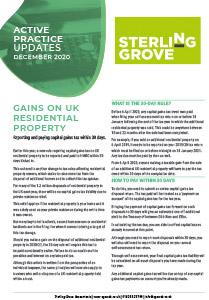Resource Hub
Gains on UK Residential Property
Reporting and paying capital gains tax within 30 days.
Earlier this year, a new rule requiring capital gains tax on UK residential property to be reported and paid to HMRC within 30 days kicked in.
This ushered in another change to tax rules affecting residential property owners, which seeks to raise more tax from the disposal of additional homes and to collect this tax quicker.
For many of the 1.2 million disposals of residential property in the UK each year, there will be no capital gains tax liability due to private residence relief.
This relief applies if the residential property is your home and it was solely used as your private residence during the entire time it was owned.
But many buy-to-let landlords, second homeowners or accidental landlords are in the firing line when it comes to being a target of this tax change.
Should you make a gain on the disposal of additional residential property in 2020/21, the 30-day rule will require this tax to be paid considerably earlier. Failure to do so could result in penalties and interest on any late-paid tax.
Although this article is written from the perspective of an individual taxpayer, the same principles will now also apply to trustees who sell or dispose of a UK residential property held within a trust.
WHAT IS THE 30-DAY RULE?
Before 6 April 2020, any capital gains tax owed was paid when filing your self-assessment tax return on or before 31 January following the end of the tax year in which the additional residential property was sold. This could be anywhere between 10 and 22 months after the sale had been completed.
For example, if you sold an additional residential property on 6 April 2019, it needs to be reported on your 2019/20 tax return which must be filed on or before midnight on 31 January 2021. Any tax due must be paid by then as well.
From 6 April 2020, anyone making a taxable gain from the sale of an additional UK residential property will have to pay the tax owed within 30 days of the completion date.
HOW TO PAY WITHIN 30 DAYS
To do this, you need to submit an online capital gains tax disposal return. The tax paid will be treated as a ‘payment on account’ of the capital gains tax for the tax year.
Bringing the payment of capital gains tax forward on such disposals to 30 days will give an estimated one-off additional yield to the Treasury of between £5 billion and £8bn.
In calculating the tax due, you are able to offset capital losses already incurred at this point.
Although you need to report such disposals within 30 days, you will also still need to report the disposal on your annual self-assessment tax return.
Through self-assessment, your final capital gains tax liability will be calculated on all asset disposals you have made during the tax year.
Any additional capital gains tax will be due on top of any capital gains tax payments on account you’ve already made.
It is only at this point that you will be able to claim a refund if you have overpaid capital gains tax within the tax year.
However, from 14 October 2020, it has been possible to amend the online return after the 30-day window as long as it is still within the normal self-assessment amendment window.
Such amendments are allowed only if the return could have included the amendment originally, by reference to things which have already occurred.
Any changes that do not meet this criteria will still need to be dealt with via the self-assessment tax return instead.
WHO NEEDS TO REPORT WITHIN 30 DAYS?
Not all residential property disposals will fall within these new reporting requirements.
If you live in the UK, you might need to report and pay capital gains tax when you sell or otherwise dispose of:
- property you’ve not used as your main home
- a holiday home
- a property you’ve let out for people to live in
- an inherited property you’ve not used as your main home.
But you will not be required to make a report and make a payment when:
- a legally-binding contract for the sale was made before 6 April 2020
- you qualify for full private residence relief
- the sale/disposal was to a spouse or civil partner
- the gain, including any other chargeable residential property gains in the same tax year, is within your tax-free allowance (£12,300 in 2020/21)
- you sold the property for a loss
- the property is outside the UK.
The above represent the more common situations that could apply, but there are other more complex disposals which can trigger this rule.
Professional advice should be sought to ensure you do not accidentally find yourself failing to report a relevant disposal.
REPORTING RELEVANT DISPOSALS
Gains on residential property disposals must now be declared on HMRC’s online capital gains tax disposal return using the capital gains tax UK property disposal service, within 30 days of completion.
Before you can do this, you will need to create a capital gains tax on UK property account which you can use to report the disposal, pay any tax due and view/change any previous returns.
Digitally-excluded taxpayers can request a traditional paper return by calling HMRC on 0300 200 3300 and quoting form reference ‘PPDCGT’.
This needs to be done for each return as it is not possible to copy one paper return and use it for multiple disposals.
Paper returns take HMRC longer to process and it has said the 30-day clock for payment of capital gains tax will not start until it has contacted you with details of how to make payment.
We can report any disposal on your behalf, although you will need to specifically authorise us to do so via our agent services account as existing 64-8 forms do not cover this service.
CALCULATING THE LIABILITY
Whether reporting the disposal yourself or using one of our experts, you will need to calculate the capital gains tax liability due before you can complete the return and have all the following information:
- property address and postcode
- date the property was purchased
- exchange date, when selling/disposing of the property
- completion date
- value of the property when you acquired it
- value of the property when you sold/disposed of it
- costs of buying, selling or making improvements to the property
- details of any tax reliefs, allowances or exemptions you’re entitled to.
Due to the pandemic, HMRC did not issue late penalties to any transactions completed between 6 April 2020 and 30 June 2020, provided the gain was reported and any tax due was paid by 31 July 2020.
HMRC confirmed transactions completed from 1 July 2020 will receive a late-filing penalty if they are not reported within 30 days, while interest will be charged for all transactions in 2020/21 if the tax remains unpaid after 30 days for all transactions from 6 April 2020.
If you have disposed of any additional UK residential property, it’s important to establish quickly whether capital gains tax applies to the disposal and whether it needs to be reported and paid within 30 days.
Contact us today to discuss how we can help you put together a road map that will keep your business on course for growth and success.

